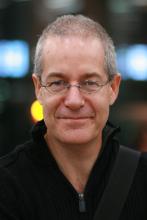What Is It
Modern science has made astounding progress in our understanding of ourselves and the universe. Physics, neuroscience, and psychology now tackle questions that a few decades ago could only be explored through philosophical speculation. So some vocal members of the scientific community, and even members of the general public, have suggested that philosophy itself has become a superfluous, archaic practice. Is philosophy useful and applicable today? Or has it been reduced to a dissociated game of mental aerobics, a mere ping-pong game of arguments and counter-arguments? John and Ken question the modern-day viability of philosophy with Massimo Pigliucci from the City University of New York, author of Answers to Aristotle: How Science and Philosophy Can Lead Us to A More Meaningful Life.
Listening Notes
John and Ken start, as they so often do, with the central question of this show: has science replaced philosophy? Is philosophy dead, as Steven Hawking has proclaimed? As philosophers, our hosts certainly hope not. John notices that believing all philosophical problems are pseudo-problems is, ironically, just another philosophical position that lacks grounding in empirical evidence. Ken points out that only in the last few centuries has science been considered separate from philosophy at all; in fact, fields like computer science and psychology have philosophy to thank for their existence! But has philosophy itself made any progress? There's certainly a lack of convergence on answers to philosophical questions but maybe, John adds, it's a mistake to assume that philosophy should make progress in the same way that science does.
Massimo Pigliucci is welcomed onto the show to weigh in. In response to the contention that philosophy doesn't impact science, Massimo points out that people like Hawking ignore the fact that there is literature in metaphysics that takes seriously discoveries in fundamental physicists, and a good number of biologists and physicists publish philosophy papers in technical journals.
John, Ken, and Massimo move on to discuss the nature of the relationship between science and philosophy. Are they competing for explanatory turf? Or do they complement one another? Massimo argues that they are contiguous and that both broadly aim at knowledge – although science deals with empirically testable propositions and philosophy deals with logical space, there is no sharp line between the two. The distinction is not one of pure fact versus pure logic; philosophy should take into account scientific research, but ideally, the converse should also be true.
But isn't philosophy simply spinning its wheels? If Aristotle attended physics class in a modern university, he might utterly be lost, but he'd find himself right at home in an ethics course. Ken and Massimo both disagree with the claim that philosophy hasn't made any progress, citing the proliferation and re-articulation of concepts over its two thousand year history. True, unlike in science, we foster dialogue with great thinkers who are long dead. But Massimo points out that philosophers do so not because the field is stagnant, but because there is still value in the works of Aristotle, Mill, and Kant – we only talk to the best of the dead philosophers. In this regard, philosophy is different from science, but not radically so.
Roving Philosophical Reporter (Seek to 5:44) : Caitlin Esch speaks with Lawrence Krauss, controversial author of A Universe from Nothing who came under fire from philosophers and theologians for assumptions regarding an appropriate definition for nothing. It is science and not philosophy, Krauss asserts, that generates knowledge and helps us understand nature. Philosophy no longer has any impact on science.
Philosophy Talk Goes to the Movies (Seek to 46:31) : John and Ken discuss Denzel Washington's Oscar-nominated performance in the movie Flight and how the complexity of his character reflects deep questions regarding addiction and freedom of the will.




Comments (1)
felixandrea
Monday, April 28, 2025 -- 9:17 PM
Love this debate! It remindsLove this debate! It reminds me of playing color block jam level — where quick reflexes (science?) meet strategic planning (philosophy?). Both are essential to master the game... and life! Maybe the real win is balancing both perspectives.